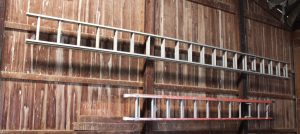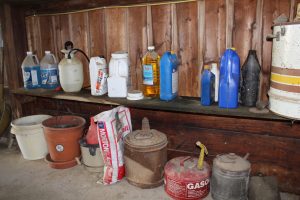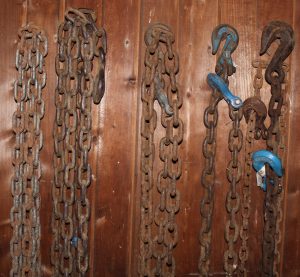I’ve been inside quite a few farm shops in my career. Enough to realize that every farmer has a different way of organizing, and that some farmers organize more than others. Some farmers have new, well-kept sheds where everything has its place, and others use an old barn or a pole building and may not care how it looks, as long as they can find what they need.
I was recently reminded of this when I took on the task of cleaning up one of my grandmother’s farm sheds.
To be fair, my grandfather was a good farmer in most areas — but keeping a clean shed wasn’t his thing. He’s been gone now for about 20 years, and in that time the shed has accumulated quite a bit of “stuff,” with more than a few things that have become misplaced. Wanting to make a difference, I began the task of cleaning it up this spring — along with the help of my aunts and a few other family members.
Here are some things I learned. Maybe my experience will help you if your own shed needs a good cleaning.
How to clean up your farm shed
1Throw away what you can
Like a lot of farmers, my grandfather kept things that he thought he might one day need. This included old metal roofing and lumber from buildings that had been torn down, boards that have since rotted and a few other things. While it is nice to keep something if you might use it, when it sits on the shed floor for 20-30 years, it’s a pretty good sign you’re not using it. The best thing might be to set it out in the trash or to take it to the proper recycling place. Some automotive places will accept used motor oil, and you can usually find a place to take scrap metal and even make a few dollars in return. Putting things into the “farm dump” may not be the best option, and depending on what you’re dumping, it could be illegal.
2 Sell what you don’t use
Just like the materials and supplies that you store, if you have farm equipment and machinery that you haven’t used in the past 10 years, you might want to ask yourself why you bother to store it. Why let something sit around and depreciate if you can get a return and free up some used space? You don’t want to get too carried away, because “you never know when you might need something,” but you also have to be realistic.
3 Hang things up
If your shed has good walls, invest in some shelves, cabinets or simply screw in some wall brackets or hanging nails. You can organize a lot just by getting things off the ground and off the workbench. Electric cords, hand tools and wrenches are much easier to find if you can store them someplace visible. Pegboards are also great for storing smaller tools.
4 Take an inventory
Things that you use regularly, like grease, motor oil and hydraulic fluid, are worth keeping in stock and will save you the frustration of running out. I ran out of grinding wheels while cutting through some scrap metal, and I had to stop what I was doing. I don’t know how long motor oil keeps on a shelf — but I assume a long time. Other things, of course, are not good to store in bulk because they will lose their volatility and their usefulness. Of course, your inventory should also include what you have in the shed, including the make and model of your most valuable possessions. This can come in handy if you experience theft or a catastrophe which requires an insurance claim.
5Control the rodents
The shed that I cleaned was so bad that I started by setting some traps. One half of the shed has a dirt floor, so groundhogs were an issue. I should emphasize “were” because I caught nine, and haven’t seen any around lately. Hopefully, you don’t have to worry about this, but if you do, get a handle on it quickly. As you probably know, rodents that dig can do a lot of damage to your structure quickly, and they make a mess out of your landscape.
6Service what needs serviced
If you’re an active farmer, you probably keep your equipment up to date. But when you fall behind, you make more work for yourself down the road. I spent several hours changing the oil on tractors and engines that hadn’t been used in a long while, applying grease and topping off the antifreeze and hydraulic fluids. Maybe I got carried away, but I knew it had been a long time since these things had been done. I also wrote the date that I serviced each thing onto a label, so that the next person, or even myself — will remember when the oil was last changed or when something was last done.
7Lighting
When a bulb blows out, replace it. And if you need to add a few bulbs, add them. Maybe it’s just me, but I don’t like to work in the dark. Although I can usually get by for a while, I find it frustrating to work under dim lighting and to not be able to see what I am doing. It’s also safer to work in a well-lit shed. And speaking of safety, make sure you have a fire extinguisher handy, and that anyone who works in the shed can find it. This can become handy when that spark turns into a flame, or when something gets a little hotter than you thought it would.
I hope these tips help you to clean up your farm shed. This is not a complete list, but these are some things I experienced first-hand and wanted to share. Another thing I experienced was vacuuming. Because half of our shed is a dirt floor, the other half had accumulated a heavy layer of dirt and dust that needed vacuuming. I used a large shop vac over the entire concrete floor of the shed, and only had to unclog the filter a dozen times!
The shed that I cleaned was a mess. Hopefully, yours is in better shape — or if it’s not — hopefully you can get it in better shape and keep it that way. You owe it to yourself to have a decent place to work on your equipment, and you’ll probably be a lot happier, too!
















